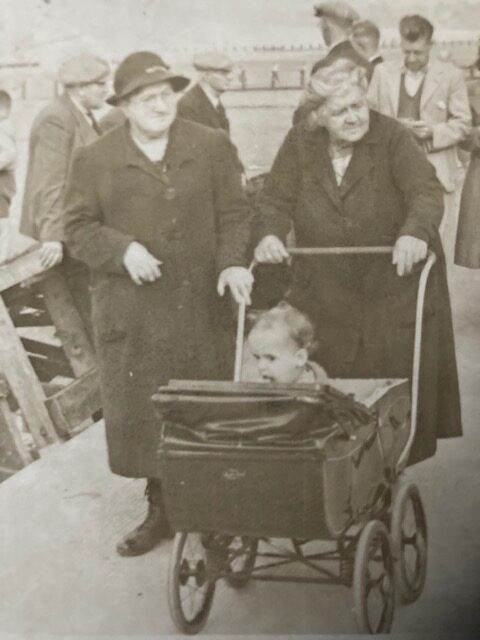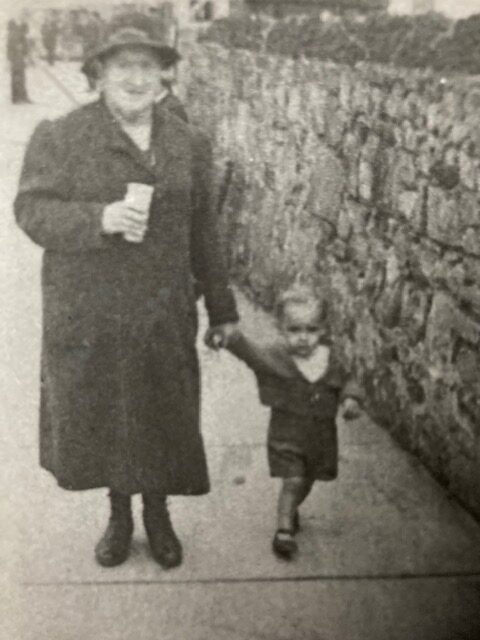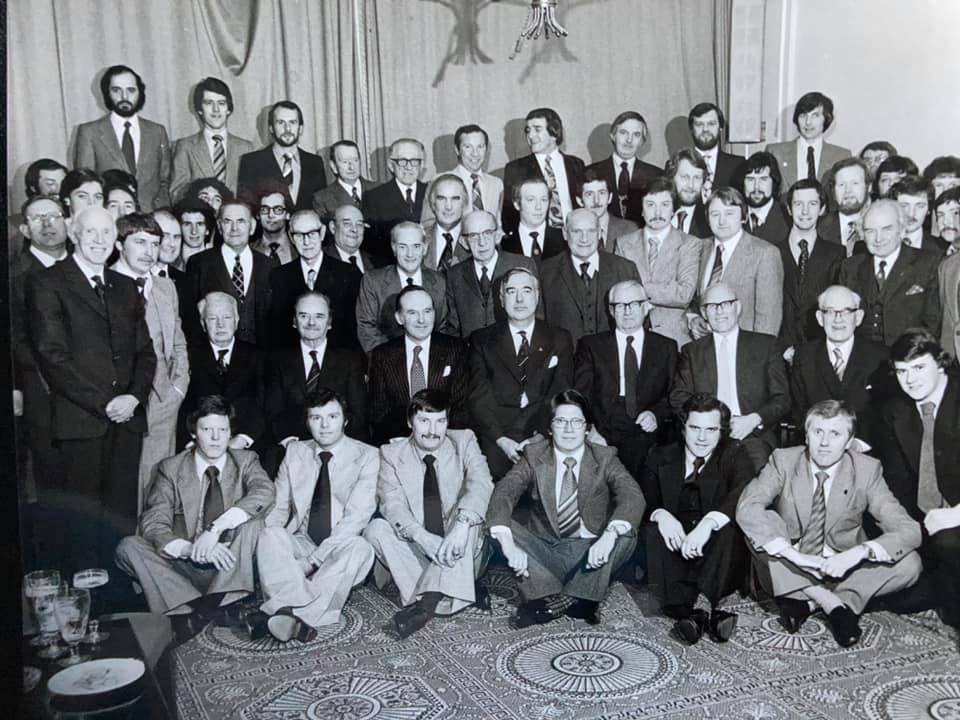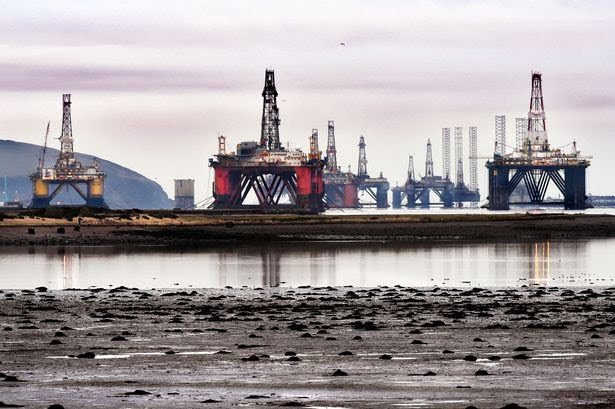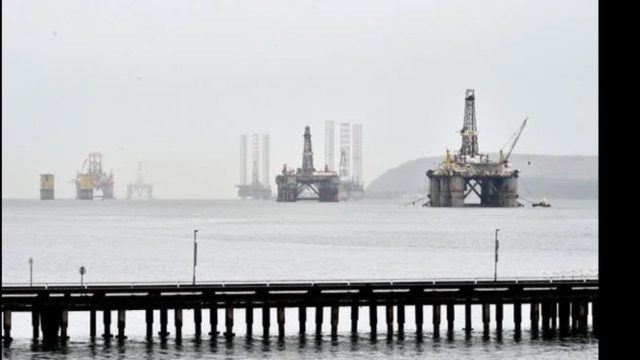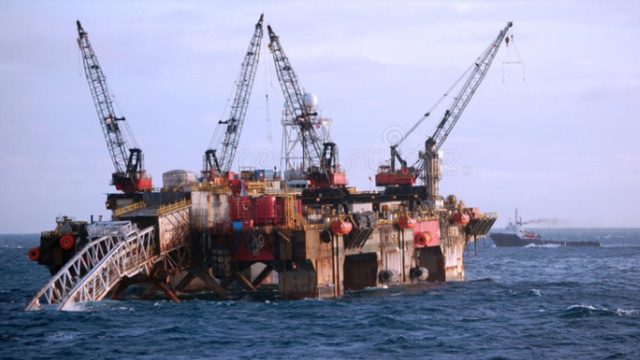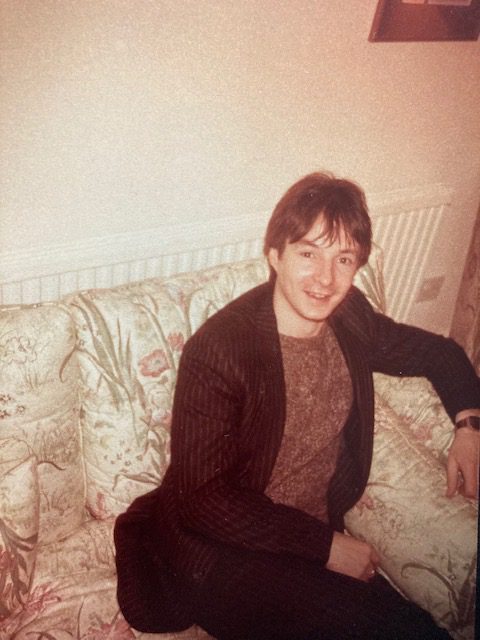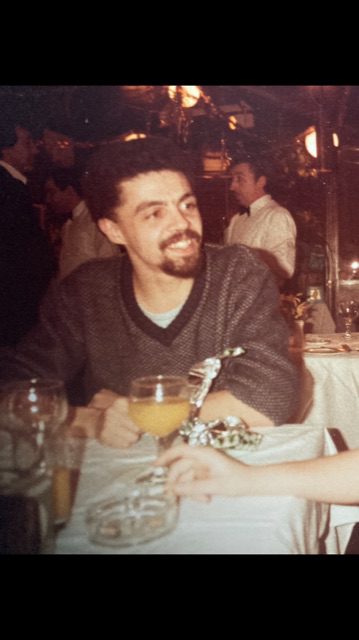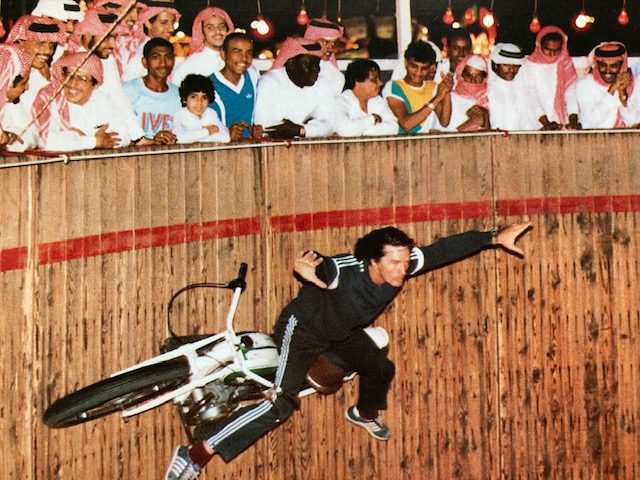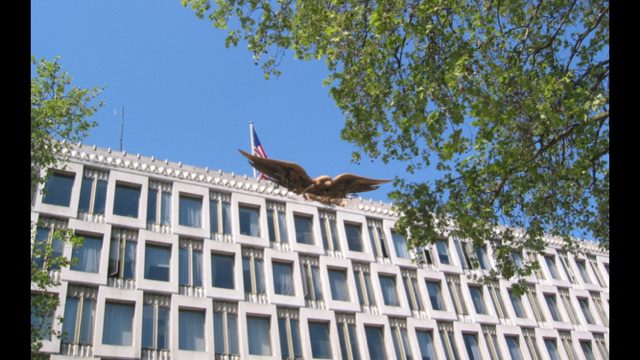Out of the Camp Ch. 40 – Immigration
When I left Edinburgh in 1967, I would tend to go home for a visit maybe two or three times a year to visit family and friends. As the years flew by however, gaps between trips became progressively larger, even more so after 1980 when my parents moved from Hyvots to Grantham in Lincolnshire to be nearer my mother’s family. One trip home I remember, however, was for the funeral of a Great Aunt on my father’s side who took care of me as an infant in Portobello when both of my parents were at work. Jenny, as everyone called her, lived with my Granny on Bridge Street Lane which was a three-minute walk from the beach. This was handy for Jenny who worked at the beach, looking after children in the swing park and because she had some sort of problem with her legs or feet. Remember, I was an infant at the time and all I know about that was that she wore huge black boots that laced up almost all the way to her knees and she walked very slowly. I think she was generally a bit slow and often wasn’t always able to answer my mother’s questions about how a particular day had gone when she returned from work. This used to make my mother mad, and she would tell my dad all about it when he came home. I didn’t like this because I loved Jenny and she always bought me ice cream.
Another event that would bring me back to Edinburgh from time-to-time would be to visit my lovely cousins in Corstorphine, Newhaven and Leith. They were all female and quite a bit older than me and now, sadly, I’ve only one left who lives with her amazing husband who looks after her on the west side of the city. When I was little, I sometimes used to be taken to my Nana Peg’s house in Granton for Sunday tea. She was the mother of my three cousins, and she had a heart as big as a house and looked after her seriously disabled husband, my Uncle Bill, who’d had a bullet lodged in his back since the first world war. Apparently, in those days it wasn’t possible to remove it without serious risk to his life. When I was very little, he was still mobile and an avid gardener very knowledgeable about horticulture. They had an allotment at the back of their tenement on the Granton Road, and I remember being out there with him one day and him explaining to me something related to the vegetables he was growing. At that time, I remember he was able to walk but couldn’t bend one of his legs. His condition must have deteriorated very quickly because it seemed that in a very few years, he was completely bedridden. Whenever we were there, he’d lay on the couch so we could all visit. A regular feature of my Sundays in Granton was that when I’d finished my main meal, for dessert I’d have to have something from every plate on the table. Nana Peg was a great baker and she’d always have an array of amazing-looking sponge cakes, pastries, cream cookies, scones, etc. and I wasn’t permitted to leave the table until I’d sampled one from every plate. She’d always say, “…and don’t look at your mother!” This, because pretty-well everyone was aware of how tough a disciplinarian my mother was. So, on these occasions I was fortunate as no one argued with my Nan Peg.
Whenever there was a 9th Edinburgh Boys Brigade event, I’d always endeavor to make the trip back to Edinburgh because there is nothing quite so magical as meeting up with people you grew up with who you haven’t seen in 30 or more years. I attended the 9th Company’s 80th Anniversary celebration in March 1979 at the Roxburghe Hotel in Charlotte Square. These events essentially comprised a casual social gathering on a Saturday evening in a lounge giving people the opportunity to renew old acquaintances. For me, this part of the event was the most enjoyable of the whole weekend and never seemed to last long enough to catch up with all the people you wanted to. This was normally followed by a formal dinner including speeches and toasts, etc. Then, the following morning we would attend service at the church the Company was attached to, the Tron Church in Moredun, and we’d observe Church Parade carried out by today’s 9th Company. Unfortunately, the company had diminished to but a specter of its earlier luminous splendor, numbers having dwindled dramatically from the 100+ strong membership of my youth, at the time the largest in the city. Of course, today’s youth have many more distractions than we did back then but, nonetheless, I think the diminution that has taken place to be a great pity.
Twenty years later in March 1999 we celebrated the Company’s Centenary at the Scandic Crown Hotel on the High Street in Edinburgh. The reunion followed much the same form as the earlier celebration. Had it not been for my dad urging me to attend the Centenary, I most likely wouldn’t have gone because it fell approximately just six weeks following the sudden death of Mary, my 49-year-old wife of thirty years. This date in January 1999 was the start of what was undoubtedly the darkest two years of my life. I was in an utter daze for many weeks following her loss and I really didn’t feel I was going to be able to socialize so soon after losing her. I always remember an event we’d attended a few years earlier when I’d had the opportunity to introduce her to Bill Syson, our Boys Brigade Company Captain. Bill was a senior officer of the Bank of Scotland and manager of the Bank’s head office branch at The Mound in Edinburgh. Her first words to him on meeting were, “I’ve heard a lot about you.” Without missing a beat his response was to take his forefinger and draw it slowly across his throat. She was highly entertained by that. Mary was Irish by birth and loved to laugh. She was second eldest in a family of five siblings and was born in Fermoy, County Cork, living there until she was five, when the family moved to Tyneside. Seven years later they moved again to Barry in South Wales until she left home for London to start her nurse training which is what ultimately led to our meeting. Mary possessed a razor-sharp wit and rejoiced in encountering people who could match her incisive banter. She read voraciously, everything from the classics to fiction and even love stories when well written, and she was an excellent writer but never fully realized her full potential in that art. Our home was always full of people because they were just drawn to her and there was always laughter. I used to say she could walk into a room full of complete strangers and within the space of a minute or two have the whole place in uproar. She was very outspoken and so, of course, not everyone was enraptured by her explosive personality but her passing left a huge void.
In any event and getting back to the Centenary celebration, I followed my dad’s advice of focusing on moving forward and specifically began making plans for my trip to Edinburgh. It turned out to have been a revitalizing decision and the first opportunity I’d had to lift myself out of a weeks-long funk and lose myself in the meeting-up of all those old pals from my early teens, re-living wonderful memories of our days in the Boys Brigade all those many years ago.
It felt as though the ground was shifting beneath my feet as reports began surfacing about an impending worldwide downturn in offshore oil and gas operations including North Sea development activities, specifically exploration and construction. Further investigation revealed that there had been a worldwide surplus of crude oil caused by falling demand following the 1970s energy crisis. From a peak in 1980, there was a six-year decline in the price of oil, which reduced the price by half in 1986 alone. The knock-on effect was that our clients in the exploration sector began stacking rigs, mainly at Ardersier, near Nairn, in Scotland and releasing staff. Similarly, heavy construction barges were towed to either Antwerp or Rotterdam and parked there until it made economic sense to begin laying pipe, setting jackets and building topsides again. So, naturally, without any activity there was no need to retain any of the crew other than security and basic maintenance staff. All other personnel, therefore, including radio-electronics technicians, medics, helicopter landing crews or any of the other specialist classes of personnel we had serving onboard were let go. Our business activities, therefore, in the space of two or three months shrunk to around 20-25% of their former level. We continued with all activities and diversification projects for a period, but it very soon became evident that I wasn’t going to be able to avoid taking some drastic measures.
The most obvious of these was the music publishing operation which was undoubtedly showing great promise as a number of the groups and writers we’d had under contract had signed record contracts with both independent and major companies. We were registered with (PRS) the Performing Rights Society and the business was generating income from both sales and airplay, but it wasn’t anywhere close to breaking even. Other labels had one or two of our acts under consideration without having yet made any firm commitment. There was no alternative to releasing everyone from their respective contractual obligations and winding things up. This, of course, included terminating the two guys who’d been running the operation which was particularly hard. Tony and Steve had become friends over the few years that we’d been working together, and we collectively believed that given time, the publishing operation had the potential to outgrow the parent offshore business but now, sadly, we’d never find out if this were so.
There was also the outdoor entertainment business which at the time of this crisis was in something of a limbo since the two contracts which we’d fulfilled in Saudi Arabia had been completed and we were awaiting further word from Dima in Jeddah about a possible third assignment from a new client. In any event, it transpired that both of the original Jeddah-based companies, having honored the initial phase of the contract, had reneged on the ongoing search and recruitment agreement for future acts since, having now made connections in that field through the personnel we provided, they now proposed to handle the recruitment, visa and transportation for the new personnel themselves. This, as intimated, was a blatant breach of contract but the prospect of prevailing in a lawsuit of this nature against a Saudi company is unheard of and isn’t even worthy of consideration. So, this business essentially took care of its own demise without much effort or loss of sleep on my part. But it was enormous fun while it lasted. Of all the places I’ve been to in the world, nowhere have I experienced so many instances of utter astonishment, both positive and negative. I’ll never forget it.
The remnants of the offshore operation continued for several more years thanks mainly to certain clients having fixed term overseas exploration contracts, also the heavy lift transport ships and the British Gas ongoing operations in the Irish Sea, but our company was a shadow of its former self and during the years we waited hopefully for the oil price to rise again, Mary and I began to once again, discuss the long-contemplated move to the USA. In our field and under normal circumstances, the logical region to have focused on would have been Texas because, not only was it the USA oil capital, but in the energy sector in general it was pre-eminent in the world. However, these weren’t normal times; the Texas economy at that time was severely depressed and there had been a record number of bankruptcies. Further, the financial climate was showing no sign of improving in the short term and, as in the North Sea and Europe in general, offshore exploration, drilling and construction were at a virtual standstill. To cut a long story short and following a further trip to Los Angeles to investigate potential business opportunities, and with further encouragement from several sources in addition to the promise of a potential business lead, we made the decision to emigrate to the USA. There followed many months of immigration bureaucratic procedures, background checks and INS interviews. Mary filing applications with hospitals for nursing positions and taking the CGFNS Examination. This is the US Organization responsible for screening and testing graduates of foreign nursing schools. I can’t recall fully all the countless steps, but it took shortly over a year before our H Visas were issued and we could begin preparations for our departure.
Images.
(1) Jennie & Grannie Murray pushing me in the pram along Portobello Prom. 1947 approx. (2) Jennie taking me for a walk along the prom at Portie. (3) 9th Edinburgh Company Boys Brigade Centenary, at the Scandic Crown Hotel, High Street, March 1999. (4) Rigs stacked at Ardersier, Scotland during the offshore industry downturn in the mid-80s. (5) Parked pipelaying/construction barge. (6) Semi-submersible and Jack-up rigs stacked in the Moray Firth near Ardersier, Scotland during the offshore industry downturn in the mid-80s. (7) Steve Thompson, Radioman Music. 1985. (8) Tony Baggett, Radioman Music. 1985. (9) Former US Embassy, Grosvenor Square, Mayfair, London. (10) Dima on the Wall of Death, Jeddah, Saudi Arabia, 1984.
